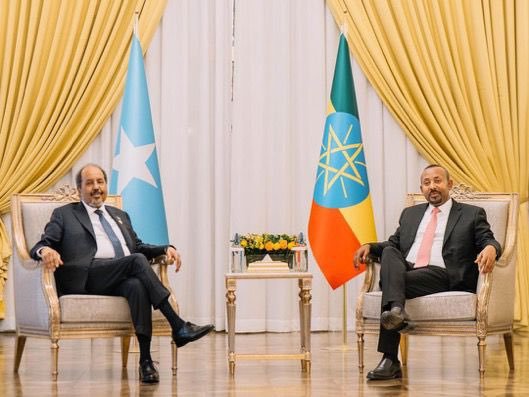Addis Ababa, 27 July 2025 Somali President Hassan Sheikh Mohamud arrived in the Ethiopian capital Addis Ababa to join the UN Food Systems Summit +4, a global top-level event co-hosted by Italy and Ethiopia on 27-29 July. The summit, now at its fourth edition since the initial 2021 one, is an international platform to assess progress and accelerate action towards making food systems sustainable, equitable and resilient.
President Mohamud’s presence in the event signifies Somalia’s increasing development and diplomatic engagement under his second term of leadership, focusing mainly on revolutionizing the nation’s agricultural sector to battle food insecurity fueled by climate change, protracted droughts and conflict.
Somalia has been grappling with food crises for ages, and the last few years have just exacerbated the challenge. A 2023 United Nations report indicated that severe drought in the Horn of Africa pushed over 6.6 million Somalis, roughly one-third of the nation’s population, into acute food insecurity. The drought was described as the worst in almost four decades, destroying crops, killing livestock, and driving hundreds of thousands of people from their homes.
President Mohamud, who took back the office in 2022, has prioritized agri-resilience and climate adaptation as key pillars of his administration’s agenda. His appearance at the UN Food Systems Summit +4 indicates Somalia’s focus on acquiring investment, technical support, and collaboration that can restart its troubled food industry.
“Not only is our focus on emergency relief,” President Mohamud stated as he departed. “It is to building a climate-resilient system, to enabling farmers, and to ensuring that no Somali ever goes hungry again.”
2025 UN Food Systems Summit +4 convenes heads of state, ministers, civil society, business leaders, and UN agencies to share the progress made since the 2021 Food Systems Summit. It aims to:
Track national and global commitments to sustainable food systems.
Facilitate investment in agro-innovation and food value chains.
Promote climate-smart agriculture and resilience planning.
Enhance coordination among governments, donors, and multilateral institutions.
With co-hosts Ethiopia and Italy, the summit is a demonstration of a changing North-South partnership in working against food security a crisis across borders. Italian Prime Minister Giorgia Meloni and Ethiopia’s Prime Minister Abiy Ahmed both delivered opening speeches urging immediate, unified action against rising global hunger levels.
UN Secretary-General António Guterres, who spoke virtually, called for an “overhaul of failed food systems that leave billions hungry and malnourished.” Leaders, he said, must bring food system transformation into line with climate action and peacebuilding.
Somalia comes to Addis Ababa with an uncompromising message: in the face of huge challenges, the country remains resolute on food sovereignty and sustainability. President Mohamud will hold a series of bilateral meetings, particularly with donors and development partners, to:
Secure technical support on irrigation, seed availability, and crop diversification.
Urge climate finance tailored to the requirements of the Horn of Africa.
Seek regional harmonization on food trade and cross-border agriculture programs.
The Somali delegation is composed of representatives from the Ministry of Irrigation and Agriculture, National Disaster Management Agency (SoDMA), and climate civil society associations. They are sharing Somalia’s national food systems roadmap, which includes drought-resilient crops, community food systems, and investments in rural infrastructure.
The summit also provides a platform for the countries of the Horn of Africa to deal with some of the shared weaknesses. Djibouti, Kenya, Ethiopia, and Sudan participating in the event are all faced with similar weaknesses: unreactive rainfall, rising food prices, conflict-induced displacement, and poor access to opportunities for climate adaptation.
President Mohamud has also called for a regional food security compact, calling for further trade integration and cooperation in terms of knowledge transfer within the region. This cooperation can reduce dependence on foreign assistance and increase regional resilience to future shocks.
As Somalia treads the fine line between emergency response and long-term development, participation in forums like the UN Food Systems Summit +4 represents a step toward solution-focused diplomacy. Obstacles remain high mainly procurement of capital and keeping political stability intact but that Somalia’s president is part of global debate on food reform is a sign of growing aspirations to redesign the country’s story.
No longer mere survival it is revival.
Top Summit Dates: July 27–29, 2025
Venue: Addis Ababa, Ethiopia
Topic: “Accelerating the Transformation of Food Systems for People, Planet and Prosperity”
President Hassan Sheikh Mohamud Arrives in Addis for UN Food Summit Focused on Global Food Security



